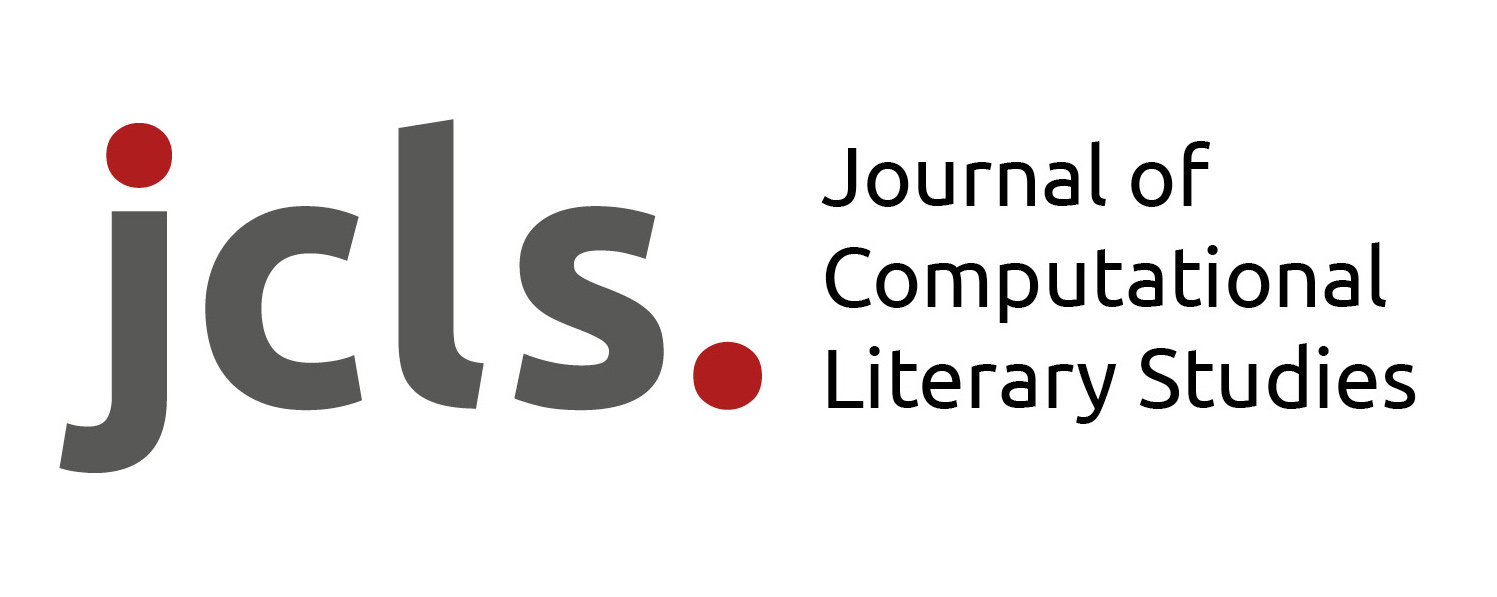Articles
39 results
Operationalization and Interpretation Dependence in Computational Literary Studies
Janina Jacke
2025-03-24 Volume 4 • Issue 1 • 2025
Repetition and Innovation in Dramatic Texts. An Attempt to Measure the Degree of Novelty in Character's Speech
Botond Szemes and Mihály Nagy
2024-12-18 Volume 3 • Issue 1 • 2024 • 1-27
BookNLP-fr, the French Versant of BookNLP. A Tailored Pipeline for 19th and 20th Century French Literature
Frédérique Mélanie-Becquet, Jean Barré, Olga Seminck, Clément Plancq, Marco Naguib, Martial Pastor and Thierry Poibeau
2024-11-21 Volume 3 • Issue 1 • 2024 • 1-34
A Stylometric Analysis of Seneca's Disputed Plays. Authorship Verification of Octavia and Hercules Oetaeus
Paschalis Agapitos and Andreas van Cranenburgh
2024-11-14 Volume 3 • Issue 1 • 2024 • 1-32
Measuring Literary Quality. Proxies and Perspectives
Pascale Feldkamp, Yuri Bizzoni, Mads Rosendahl Thomsen and Kristoffer L. Nielbo
2024-10-24 Volume 3 • Issue 1 • 2024
From Review to Genre to Novel and Back. An Attempt to Relate Reader Impact to Phenomena of Novel Text
Marijn Koolen, Joris van Zundert, Eva Viviani, Carsten Schnober, Willem van Hage and Katja Tereshko
2024-10-17 Volume 3 • Issue 1 • 2024 • 1-32
Visualization as Defamiliarization. Mixed Methods Approaches to Historical Book Reviews
Daniel Brodén, Jonas Ingvarsson, Lina Samuelsson and Victor Wåhlstrand Skärström
2024-10-10 Volume 3 • Issue 1 • 2024 • 1-26
Neither Telling nor Describing. Reflective Passages and Perceived Reflectiveness 1700–1945
Benjamin Gittel, Florian Barth, Tillmann Dönicke, Luisa Gödeke, Thorben Schomacker, Hanna Varachkina, Anna Mareike Weimer, Anke Holler and Caroline Sporleder
2024-10-03 Volume 3 • Issue 1 • 2024 • 1-24
Small Worlds: Measuring the Mobility of Characters in English-Language Fiction
Matthew Wilkens, Elizabeth F. Evans, Sandeep Soni, David Bamman and Andrew Piper
2024-09-26 Volume 3 • Issue 1 • 2024 • 1-16
The Anxiety of Prestige in Stephen King’s Stylistics
Erik Ketzan and Martin Paul Eve
2024-09-26 Volume 3 • Issue 1 • 2024 • 1-20
Mapping Cultural Networks in the Global South Book Market
Adriana Rodríguez Alfonso
2024-09-17 Volume 3 • Issue 1 • 2024 • 1-36
Computational Approaches to Opera Libretti
Luca Giovannini and Daniil Skorinkin
2024-07-15 Volume 3 • Issue 1 • 2024 • 1–23
The Schemer Unmasked. Sketching a Digital Profile of the Scheming Slave in Roman Comedy
Julia Jennifer Beine
2024-05-27 Volume 3 • Issue 1 • 2024 • 1–29
Connecting the Dots. Variables of Literary History and Emotions in German-language Poetry
Leonard Konle, Merten Kröncke, Simone Winko and Fotis Jannidis
2024-03-28 Volume 2 • Issue 1 • 2023 • 1–22
What's that Scary Sound? Ambient Sound in Gothic Fiction
Svenja Guhr and Mark Algee-Hewitt
2024-03-24 Volume 2 • Issue 1 • 2023 • 1–28
What Do Characters Do? The Embodied Agency of Fictional Characters
Andrew Piper
2024-03-22 Volume 2 • Issue 1 • 2023 • 1–12
Need a Good Book about Privacy? Evaluating Dictionary-Based Corpus Query for Detecting the Topic of Privacy in Literary Texts
Erik Ketzan, Jennifer Edmond and Carl Vogel
2024-03-06 Volume 2 • Issue 1 • 2023 • 1–19
InvBERT: Reconstructing Text from Contextualized Word Embeddings by inverting the BERT pipeline
Kai Kugler, Simon Münker, Johannes Höhmann and Achim Rettinger
2024-03-05 Volume 2 • Issue 1 • 2023 • 1–18
The Authorship of Stephen King’s Books Written Under the Pseudonym “Richard Bachman”: A Stylometric Analysis
Dorothy Henriette Modrall Sperling, Mike Kestemont and Vincent Neyt
2024-03-02 Volume 2 • Issue 1 • 2023 • 1–35
Why the Daisy Sisters are Different. A Stylometric Study on the Oeuvre of Swedish Author Henning Mankell and the Dutch Translations of his Work
Martje Wijers
2024-02-25 Volume 2 • Issue 1 • 2023
Translation-based connotation visualization for classical poetic Japanese vocabulary of the Kokin Wakashū ca. 905
Xudong Chen, Hilofumi Yamamoto and Bor Hodošček
2024-02-16 Volume 2 • Issue 1 • 2023 • 1–32
Gender Depiction in Portuguese. Distant Reading Brazilian and Portuguese Literature
Cláudia Freitas and Diana Santos
2024-02-14 Volume 2 • Issue 1 • 2023 • 1–29
Automatic Topic-Guided Segmentation of Holocaust Survivor Testimonies
Eitan Wagner, Renana Keydar, Amit Pinchevski and Omri Abend
2024-02-10 Volume 2 • Issue 1 • 2023 • 1–26
A Sentence-Based Stylistic History of the Hungarian Novel
Botond Szemes
2024-02-10 Volume 2 • Issue 1 • 2023
Extracting Geographical References from Finnish Literature. Fully Automated Processing of Plain-Text Corpora
Harri Kiiskinen, Asko Nivala, Jasmine Westerlund and Juhana Saarelainen
2024-01-30 Volume 2 • Issue 1 • 2023
